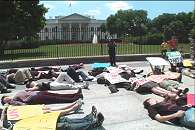2006年VOA标准英语-Call for Action to Stop Fighting in Darfur, Sud(在线收听)
By Deborah Block
Washington, DC
24 October 2006
watch Darfur Ad Campaign
Newspaper advertisements appeared in two major American newspapers recently (Washington Post and New York Times) calling on the international community to take strong action against Sudan's government to halt the conflict between the government and rebels in Darfur, Sudan. A private, bi-partisan, U.S. foreign policy group called "Partnership for a Secure America" says it placed the advertisement to encourage policy-makers to act to protect the huge numbers of people affected by the fighting.
 |
| Demonstrators stage protest over Darfur in front of White House |
Chip Andreae, co-chair of Partnership for a Secure America, says policy-makers must take concrete steps now to end the conflict. "Our efforts were really directed at foreign policy leaders themselves -- the leadership that we find in Congress, the leadership in the executive branch of government, and to the extent that embassies and the U.N. and other individuals who follow and care for Darfur would want or need to focus on it."
Colin Thomas-Jensen is with the International Crisis Group in Washington, which works to prevent conflict worldwide. He says the Darfur newspaper advertisement can help put pressure on policy-makers. "There does seem to be a growing recognition among policy-makers, both in the U.S. government and outside, that we need to take a much stronger line with the government of Sudan."
The fighting began in 2003, when ethnic African tribes revolted against the Arab-led Sudanese government. Sudan's President Omar Hassan al-Bashir retaliated by unleashing brutal Arab militias, known as janjaweed, which have been attacking rebels and civilians. The partnership says rape and murder are happening every day and charges the Sudanese government with genocide.
Andreae adds, "I think it's been raised to the level of genocide by the number of people, by the ferocity of the anger and toughness used by the government of Sudan."
Ill-equipped African Union soldiers trying to keep peace in Darfur have been largely ineffective. The United Nations wants to replace them with U.N. peacekeeping troops, but the Sudanese government has rejected the plan.
The newspaper advertisement says if a U.N. force is not deployed, then NATO-led intervention should be considered. It also says it is time to approve a NATO-led no fly zone over Darfur, expand sanctions on the Sudanese government, freeze Sudan's assets, and block its oil exports.
Andreae says the international community should help. "We need to be engaged with Russia, China, and the Arab League and other institutions which have an interest in this subject to specifically draw them more deeply to the process, be more fully engaged, and that we need to look at the role NATO might play in yet providing another level of deterrent for the activities that cannot go on."
Hunger is rampant in Darfur. The U.N. World Food Program says it is not able to feed some 350,000 people because of a lack of security. Sudan's president denies there is a hunger crisis.
Thomas-Jensen says it is imperative additional international pressure be applied to alleviate the situation. "To this point, the government seems conditioned to accept the fact that they can get away with just about anything. They're acting with impunity. They've launched a new offensive in north Darfur. And so we're seeing the effects of this small dog diplomacy over the past few years, incessantly barking, but with very little bite, and so if we start to clamp down and impose some of these non-military measures, in an effort to get them to bend and accept a U.N. force, I think that's the first step."
Chip Andreae says there has been positive feedback to the advertisement from some members of the U.S. Congress, which he hopes will translate into constructive action against the Sudan government.